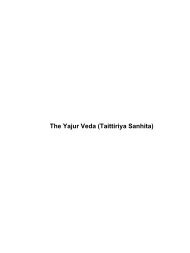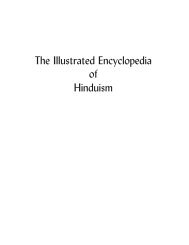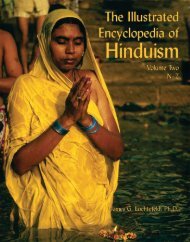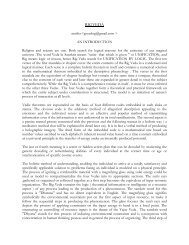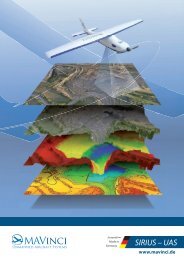A Concise Encyclopedia of Hinduism Klaus K Klostermaie
You also want an ePaper? Increase the reach of your titles
YUMPU automatically turns print PDFs into web optimized ePapers that Google loves.
Durväsas 62<br />
Durväsas<br />
(‘ill-dressed’, ‘naked’)<br />
A sage, son <strong>of</strong> ATRI and Anusüyä, noted<br />
for his irascibility. He cursed ŸAKUN-<br />
TALÄ for keeping him waiting at the<br />
door and thus caused her separation<br />
from King Du•yanta. His blessing<br />
caused Kuntï to become the virgin<br />
mother <strong>of</strong> KARŒA by the sun. He also<br />
cursed Kø•æa for a minor fault and foretold<br />
for him the manner <strong>of</strong> his death.<br />
Duryodhana (‘hard to conquer’)<br />
Eldest son <strong>of</strong> Dhøtarä•flra and leader <strong>of</strong><br />
the KAURAVAS in the Great War <strong>of</strong> the<br />
Mahäbhärata.<br />
düta (‘messenger’, ‘envoy’)<br />
Messengers play a great role in classical<br />
Sanskrit drama. See, for example, the<br />
famous poem by KÄLÏDÄSA, Meghadüta,<br />
(‘The Cloud-Messenger’).<br />
duties<br />
The Hindu ethic is an ethic <strong>of</strong> duties<br />
rather than rights. According to Vedic<br />
tradition a human is born with five<br />
‘debts’ (øæa) or duties which he has to<br />
redeem during his life: duties towards the<br />
gods, parents and teachers, guests, other<br />
human beings and all living beings. Each<br />
VAØŒA has specific duties as well. Most<br />
Hindus believe that they have a lifelong<br />
duty to perform formal worship and to<br />
recite certain religious texts or formulae.<br />
Membership in particular SAßPRADÄYAS<br />
also entails specific duties with regard to<br />
worship, mode <strong>of</strong> life, relation to fellow<br />
members. (See also DHARMA.)<br />
Dvaita Vedänta (‘Dualistic Vedänta’)<br />
A school <strong>of</strong> Vedänta founded by<br />
MADHVA, which emphasizes the nonidentity<br />
<strong>of</strong> humans and the ultimate.<br />
Developed in direct opposition to<br />
ADVAITA, Dvaita teaches ‘five differences’<br />
(pañca bhedä): the difference<br />
between God and humans; between<br />
nature and God; between individual<br />
humans; between humans and inanimate<br />
objects; and between one inanimate<br />
object and another.<br />
dvandvas (‘pairs <strong>of</strong> opposites’)<br />
For example, hot–cold, bright–dark,<br />
which characterize the world <strong>of</strong> change<br />
and impermanence, in contrast to the<br />
all-oneness <strong>of</strong> the ultimate.<br />
Dväpara Yuga<br />
The third <strong>of</strong> the four world ages, preceded<br />
by Køta Yuga and Treta Yyuga,<br />
and followed by Kali Yuga.<br />
Dvärakä<br />
Famous ancient city on the west coast <strong>of</strong><br />
India, one <strong>of</strong> the seven ancient holy<br />
cities <strong>of</strong> India, Kø•æa’s capital. It was<br />
submerged in the ocean but has recently<br />
been partially excavated.<br />
dvi-jäti (‘twice-born’)<br />
Appellation <strong>of</strong> the three higher CASTES<br />
(Brahmin, K•atriya, Vaiÿya), whose initiation<br />
(upanayana) is seen as ‘second<br />
birth’, which entitles them to participate<br />
in ritual activity. (See also SAßSKÄRA.)<br />
dvïpa (‘island’, ‘continent’)<br />
In Hindu cosmography the continents<br />
(dvïpas) stretch out like the leaves <strong>of</strong> a<br />
lotus from the centre occupied by<br />
Mount MERU and are separated from<br />
each other by distinct circular oceans.<br />
There are seven such dvïpas separated<br />
by seven oceans consisting <strong>of</strong> different<br />
liquids: Jambu-dvïpa, surrounded by<br />
lavana (salt water); Plaksa-dvïpa, surrounded<br />
by ïk•u (sugarcane juice); Ÿälmala-dvïpa,<br />
surrounded by suøä (wine);<br />
Kuÿa-dvïpa, surrounded by sarpis (clarified<br />
butter); Krauñca-dvïpa, surounded<br />
by dadhi (curds); Ÿäka-dvïpa, surrounded<br />
by dudgha (milk); Pu•kara-dvïpa,<br />
surrounded by jala (sweet water).




